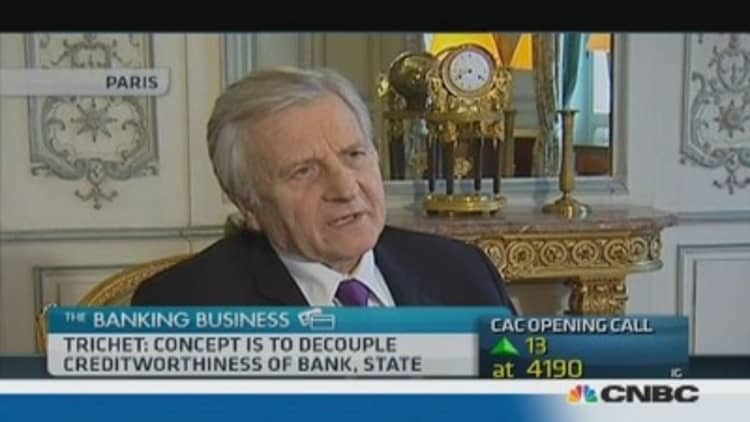
The creation of a new union for Europe's banks has already been subject to more negotiations than a billionaire's pre-nup agreement, but the work is far from over, the former head of the European Central Bank says.
The leaders of the European Union's reached a long-awaited agreement this week on a mechanism to manage the closure of the region's failing banks. The so-called single resolution mechanism, together with bolstering of the ECB's supervisory powers and region-wide deposit insurance, makes up the European "banking union" – a deal that should drastically reduce the need for tax-payer funded rescues of banks.
"The concept is to decouple the bank from the state," Jean-Claude Trichet, who was President of the European Central Bank for much of the region's debt crisis, told CNBC.
"I expect this goal will be obtained, but it is a work in progress."
A 55 billion euros bailout fund, one of the most important tenets agreed on this week, will only be ready in 2026, raising the question of what will happen if a bank collapses in the interim.
(Read more: Europe's banking plans: What you need to know)
The ECB is going to take over as the regulator for all EU banks. First, banks will be subject to more rigorous assessments of their balance sheets next year – and there are concerns some weaker institutions may fail the so-called stress tests.
"I don't think the test will be tough or not tough. It has to be absolutely comprehensive, absolutely fair and taking into account all the risks, and I'm sure that's what the ECB has in mind," Trichet said.
"This is a hard work, x-ray of the various institutions which is being done and has to be done impeccably."
(Read more: Why you should beware of Southern Europe)
Plans for banking union followed the fallout from the euro zone debt crisis, which resulted in the cost of banks and countries' debts spiking. The ECB has injected more than 1 trillion euros of cheap loans into the banking system, known as LTROs, from late 2011, and offered to buy up unlimited amounts of bonds in struggling countries – all of which has helped restore faith in the euro zone. Its president Mario Draghi has vowed to do "whatever it takes" to save the euro.
The EU had its long-term credit rating cut to AA plus from AAA by ratings agency Standard & Poor's (S&P) on Friday, over concerns about "contentious" budget negotiations.
(Read more: Why Europe's bond rally may be ending)
"In our view, EU budgetary negotiations have become more contentious, signalling what we consider to be rising risks to the support of the EU from some member states," S&P wrote in a statement.
The chief executive of one of France's largest banks defended Europe's banking system in an interview with CNBC Friday and said the ECB had done a "great job".
Frederic Oudea, chief executive of Societe Generale, said: "The banking system is in a much better shape than people think."
- By CNBC's Catherine Boyle. Twitter: @cboylecnbc.


